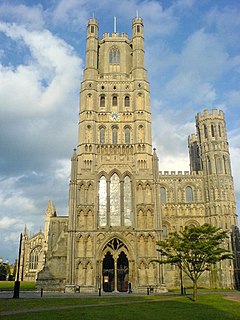Ely, Cambridgeshire
| City of Ely | |
|---|---|
 West façade of Ely Cathedral from Palace Green, the former village green |
|
| City of Ely shown within Cambridgeshire | |
| Area | 23 sq mi (60 km2) |
| Population | 20,256 |
| • Density | 881/sq mi (340/km2) |
| OS grid reference | TL5379 |
| Civil parish |
|
| District | |
| Shire county | |
| Region | |
| Country | England |
| Sovereign state | United Kingdom |
| Post town | ELY |
| Postcode district | CB6, CB7 |
| Dialling code | 01353 |
| Police | Cambridgeshire |
| Fire | Cambridgeshire |
| Ambulance | East of England |
| EU Parliament | East of England |
| UK Parliament | |
| Website | Visit Ely |
Ely (![]() i/ˈiːli/ EE-lee) is a cathedral city in Cambridgeshire, England, 14 miles (23 km) north-northeast of Cambridge and about 80 miles (129 km) by road from London. Æthelthryth (also known as Etheldreda) founded an abbey at Ely in 673; the abbey was destroyed in 870 by Danish invaders and was rebuilt by Æthelwold, Bishop of Winchester, in 970. Construction of the cathedral was started in 1083 by a Norman abbot, Simeon. Alan of Walsingham's octagon, built over Ely's nave crossing between 1322 and 1328, is the "greatest individual achievement of architectural genius at Ely Cathedral", according to architectural historian Nikolaus Pevsner. Building continued until the dissolution of the abbey in 1539 during the Reformation. The cathedral was sympathetically restored between 1845 and 1870 by the architect George Gilbert Scott. As the seat of a diocese, Ely has long been considered a city; in 1974, city status was granted by royal charter.
i/ˈiːli/ EE-lee) is a cathedral city in Cambridgeshire, England, 14 miles (23 km) north-northeast of Cambridge and about 80 miles (129 km) by road from London. Æthelthryth (also known as Etheldreda) founded an abbey at Ely in 673; the abbey was destroyed in 870 by Danish invaders and was rebuilt by Æthelwold, Bishop of Winchester, in 970. Construction of the cathedral was started in 1083 by a Norman abbot, Simeon. Alan of Walsingham's octagon, built over Ely's nave crossing between 1322 and 1328, is the "greatest individual achievement of architectural genius at Ely Cathedral", according to architectural historian Nikolaus Pevsner. Building continued until the dissolution of the abbey in 1539 during the Reformation. The cathedral was sympathetically restored between 1845 and 1870 by the architect George Gilbert Scott. As the seat of a diocese, Ely has long been considered a city; in 1974, city status was granted by royal charter.
...
Wikipedia

